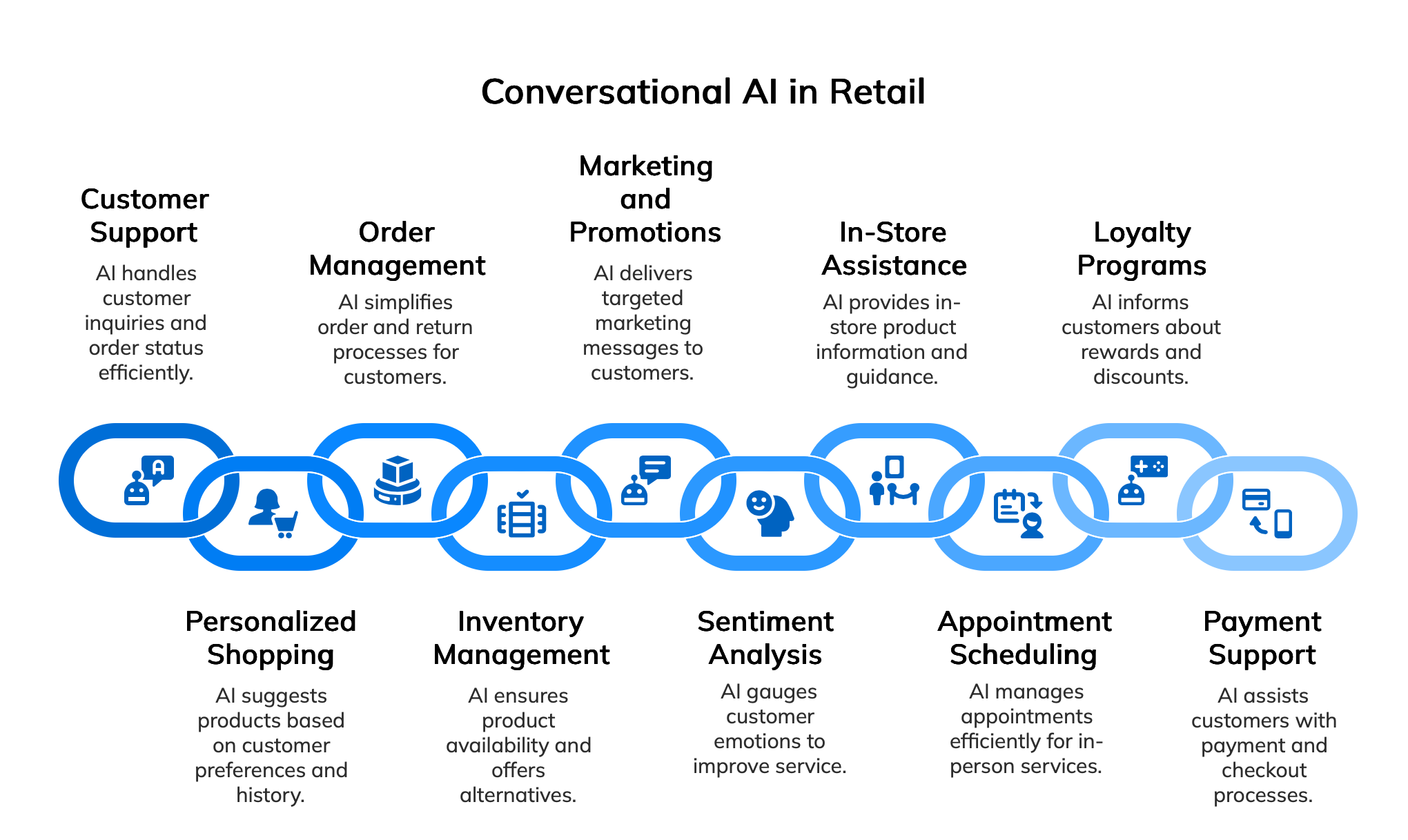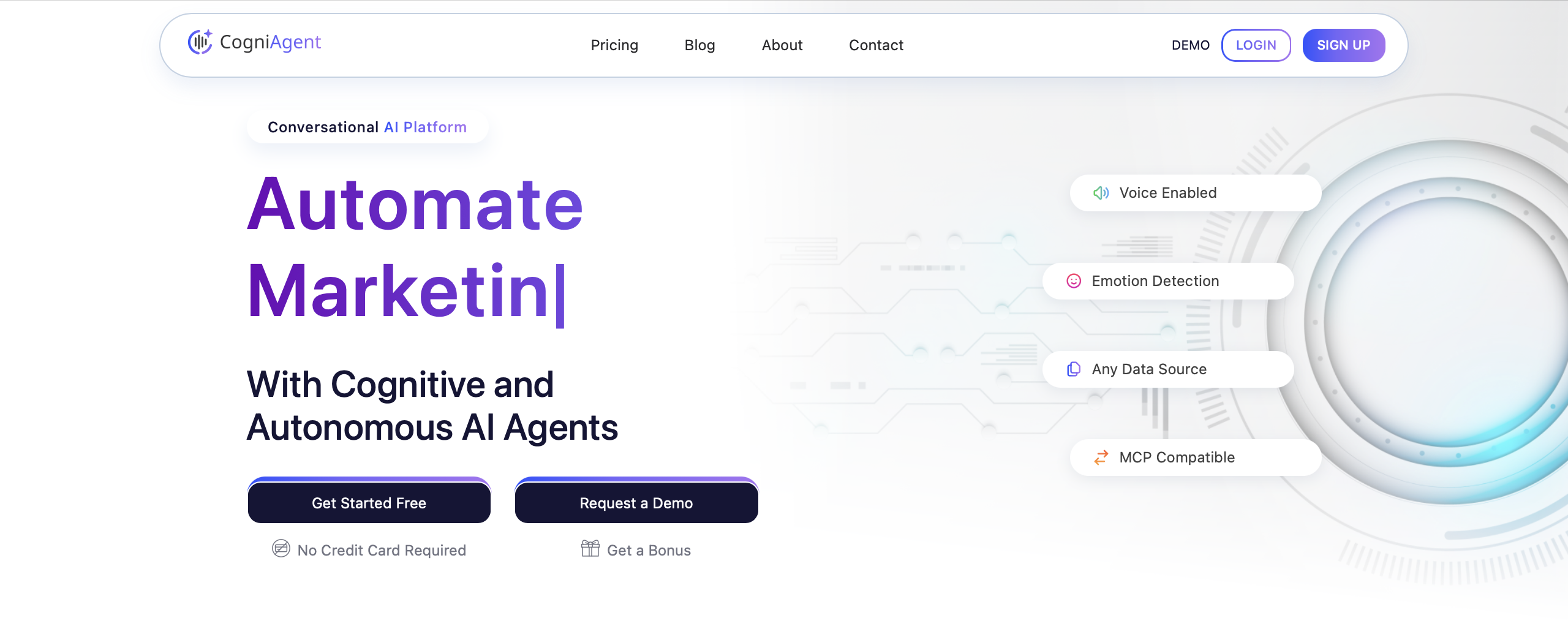
Scaling your retail business often involves adding new sales channels: e-commerce platforms, an online store, messengers, social media profiles, and more. But as channels multiply, so does the operational chaos. This, in turn, may lead to inconsistent experiences, slower response times, and increased pressure on your team. Your staff literally gets bogged down with repetitive tasks, while customers bounce between touchpoints, repeating themselves and losing trust.
Conversational AI resolves all of these problems, even before they occur. It connects every touchpoint, understands client intent across channels, and fixes issues instantly, 24/7. It’s more than a chatbot; it’s your always-on digital assistant that turns complexity into seamless service both for your team and customers.
In this article, we’ll explore how conversational artificial intelligence enhances retail and how to use it smartly in your business.
What Does Conversational AI Look Like? Overview of The Always-On Smart Retail Assistant
Conversational artificial intelligence is a pre-trained and integrated digital assistant that interacts with users like a live consultant but without time, workload, or human error constraints.
Technically, it combines NLP, integrations with internal systems (CRM, ERP, warehouse, CMS, or others), dynamic response logic, machine learning, and scenario optimization. All this comes together to create a user experience that feels as natural as a conversation with a human.
The popularity of conversational AI agents is growing. According to Gartner, by 2029, more than 80% of common customer service issues will be resolved by AI with zero human intervention. In 2023, nearly 65% of retail companies reported using AI technologies in some capacity, with AI-powered customer assistants driving significant improvements in personalization and conversion rates.
The impact is especially evident in omnichannel support. A single integrated AI agent can now instantly handle tasks that once required dozens of operators. The results speak for themselves. Businesses report that AI virtual assistants reduce wait times, and 73% of consumers agree that artificial intelligence assistants help shorten delays meaningfully.
This is what modern conversational AI in retail looks like. It’s already changing how businesses engage with customers, saving valuable resources, and helping retailers deliver a more consistent and personalized user experience across channels.
Real-World Conversational AI Use Cases in Retail
Conversational artificial intelligence is already driving measurable results in retail. It automates routine tasks, speeds up service, and helps teams handle more with less. Whether answering customer questions, managing returns, or sending targeted promotions, the intelligent tools improve daily operations and the shopping process at scale.
 Here’s how retailers use AI agents in practice:
Here’s how retailers use AI agents in practice:
Customer support
Conversational artificial intelligence takes over the bulk of customer service calls. It can answer frequently asked questions, check order status for customers, help them change shipping details, and provide information about warranties or product availability. A buyer no longer waits in line for an answer or a callback. All of this is processed instantly, around the clock.
Personalized shopping
Intelligent digital assistants can analyze purchase history, product views, client preferences, and even the query context to suggest the most relevant products. For example, a buyer looking for a gift can be asked clarifying questions (“For whom?”, “What age?”, “What budget?”). Based on the answers, conversational AI in retail provides them with a personalized product selection.
Order and returns management
A big part of customer requests concerns order processing. Instead of filling in complicated forms or making calls, a buyer simply refers to artificial intelligence with the request: “I want to change the address,” “I want to return the product,” or “I did not receive the package.” Conversational AI immediately pulls up the order, clarifies the details, and carries out the entire procedure via chat.
Inventory management and availability checks
One of the most painful scenarios that negatively impacts retailers’ reputation is when a customer selects a product, orders it, and finds out it’s out of stock. Conversational AI in retail solves this problem at the very product selection stage. It checks the stock in real time at the particular store or warehouse, offers the nearest alternative, or provides waiting time details.
Marketing and promotions
Conversational AI doesn’t just support communication; it creates and sends personalized marketing messages. For example, if a customer is browsing children’s clothing, they can receive a promotional offer for that category. The technology’s ability to recommend products dynamically, based on context and past customer interactions, enables highly customized marketing experiences.
Customer feedback and sentiment analysis
Conversational AI in retail can analyze the client’s sentiment. Suppose the user writes a message with irritation in a hostile or negative tone. In that case, the system identifies this as a risk, automatically transfers the request to an operator, or launches a client retention script. By accurately gauging customer emotions in real time, AI-empowered businesses can respond with empathy and personalized interventions, improving customer satisfaction and loyalty.
In-store digital assistance
In physical stores, AI is implemented in self-service terminals, mobile apps, or tablets used by sales associates. A buyer can find the desired product by placing a request (for example, “women’s sneakers size 39”), checking product availability, reading reviews, and getting advice without queuing or waiting for a free consultant.
Appointment scheduling
For products or services that require in-person consultation, artificial intelligence can automatically schedule a customer for an in-store appointment, a call, or a product demo. Conversational AI in retail is built to consider staff schedules and customer preferences and sends reminders, reducing the number of missed appointments.
Loyalty and reward programs
AI informs a customer about bonuses, available discounts, cashback, or gifts. For example, “You have 250 bonuses on your account. Would you like to use them on this order?” or “Make one more purchase and receive free shipping for a month.” These AI-driven interactions contribute to higher redemption rates, repeat purchases, and stronger emotional connections with a brand.
Payment and checkout support
At the moment of purchase, AI accompanies a customer until completion. It explains the available payment methods, helps with errors, and answers questions such as “Can I pay in installments?” “How does postpaid work?” or “What do I do if the card does not go through?” By providing instant, clear, and accurate responses, conversational AI reduces cart abandonment and alleviates customer frustration during checkout.
As you can see from these conversational AI use cases in retail, an intelligent assistant is a practical tool that transforms daily retail operations, significantly boosts efficiency, and facilitates the overall customer journey.
How Conversational AI Enhances Physical and Digital Retail
Conversational AI isn’t merely implemented in business processes. It’s changing the very logic of how the retail industry operates. AI’s value is evident at every point: from the first touch with a brand to a repeat purchase, from cost reduction to unlimited scaling. Here are the benefits that retailers experience after adding AI to their business:

#1. Happier clients through hyper-personalized service
Conversational AI in retail shapes each response as a personalized consultation. By studying interaction history, user behavior, preferences, and query context, the technology tailors messages to each client. Shoppers no longer have to deal with generic responses or a list of irrelevant products. They receive recommendations that meet their expectations. Such interaction creates a sense of ownership in the brand and directly impacts repeat purchases and loyalty.
#2. Higher sales without hiring more people
Every customer request in chat, messenger, or by phone is a potential sale. During high-traffic periods, live operators are physically unable to process all queries. Artificial intelligence works in parallel with an unlimited number of retail customers, suggests products, supports order processing, and stimulates upselling. Without additional staff, you get more processed requests, more completed orders, and higher revenue.
#3. Operational efficiency and empowered, not replaced, staff
Conversational AI in retail does not replace employees. It frees them from monotonous, routine work that takes hours every day. Instead of answering the same questions, employees can engage in tasks that require human empathy, creativity, or strategic thinking, like business development, personalized consulting, or increasing the average check. Your company doesn’t lose its human touch; it just finds better ways to utilize it.
#4. Shift to data-driven work
Every interaction between a conversational AI in retail and a customer is based on data: queries, interests, behavioral patterns, pain points, and more. This data is aggregated in real time and transformed into analytics, providing retailers with insights into what people are searching for, what’s working and what’s not, what messages most likely lead to sales or cancellations, etc. This lets you make informed decisions about assortment, UX, marketing campaigns, and logistics.
#5. Unprecedented scalability and competitiveness
Conversational AI in retail allows you to scale your business without fearing the system will fail. AI can support opening new stores, entering new markets, and adding new languages to the website, all without hiring new staff or conducting lengthy training. Brands previously limited to local teams are now entering global markets efficiently and flexibly.
#6. Versatile self-service across channels
The modern buyer does not want to wait. They want to answer their questions quickly and conveniently without registering for the fifth application. Conversational AI in retail always remains consistent. It delivers the same high-quality service across all channels, including the website, mobile app, messengers, email, voice, and in-store terminals. This feature significantly reduces the number of calls to live support and makes the customer experience more predictable and comfortable.
Why Choose CogniAgent as Your All-in-One Retail AI Solution
CogniAgent is a complete multi-tier ecosystem of AI-powered autonomous agents that spans all key retail functions: sales, support, logistics, marketing, HR, finance, and ERP.

The platform is designed for companies that want to go beyond responsiveness and start proactively scaling operations. Implementing CogniAgent in retail business processes increases productivity and improves customer satisfaction without the cost of hiring extra staff, adding complex systems, or enabling external integrators.
One of CogniAgent’s strengths is that it evolves its capabilities after implementation. Thanks to a six-step workflow, this intelligent agent constantly improves based on input data, user preferences, and output results.
What makes CogniAgent smarter than the average AI?
Compared to conventional solutions that simply respond to commands, CogniAgent:
- Understands the meaning and context of queries, not just keywords
- Works with voice and text, with support for real-time sentiment analysis
- Integrates with any data source: PDF, CRM, ERP, email, knowledge base, API, spreadsheets
- Works without code, with the first agent being deployed in 5 minutes
- Supports multi-agent architecture: several AI agents can work in parallel and interact with each other
Implementing CogniAgent requires no coding, allowing you to boost productivity, reduce manual effort, and scale your operations with less effort.
Find your CogniAgent AI assistant for any retail operation
As said above, CogniAgent goes beyond primitive bots and out-of-the-box artificial intelligence tools. It offers a wide set of AI Assistants, each tailored to a specific retail operation or workflow. Here are the main ones:
Customer support AI agent
CogniAgent automates responses to 60-80% of customer requests in chat, instant messengers, and by phone. It can independently process requests, create support tickets, support a customer in dialogue mode, and escalate complex situations to humans without losing context.
- Automatic ticket creation and processing
- Intent and emotion recognition
- Voice channel support with tone recognition
AI sales assistant
This agent can lead your potential customer from the first request to the order. It makes product recommendations, records meetings, responds to questions, and activates promotions, driving more sales and personalizing the user experience.
- Upsell, cross-sell, recommendations
- Personalized dialogues based on behavior
- Integration with CRM and sales funnel
Multi-agent AI
That’s one of CogniAgent’s models where several agents (sales, support, logistics, and finance) work simultaneously and in a coordinated way. One agent can transfer the dialogue to another, taking into account the history, context, and interests of the client. As a result, you make your operations more consistent and user-centric.
- Seamless transfer of dialogues
- Collaboration on customer requests
- Optimization of interdepartmental interaction
Call center AI agent
Call Center AI Agent is another AI assistant that accepts calls, identifies requests, responds in real time, analyzes emotions, and even replaces the IVR menu with natural conversation. It frees your team for more complex customer interactions while handling the basic ones.
- No waiting in line for a customer
- Voice recognition with over 95% accuracy
- Empathetic reactions to irritation or stress
Marketing AI agent
Marketing AI Agent plans, launches, and optimizes marketing campaigns based on customer data. It can segment audiences, send personalized offers, analyze effectiveness, and test different strategies. Your staff will have more capacity for creativity, while this intelligent helper organizes and manages the technical part.
- Full automation of mailings
- Integration with CMS, Google Ads, and Meta
- Continuous improvement based on A/B tests
HR AI assistant
HR AI Assistant aids your employees in navigating various HR procedures: taking sick leave, undergoing onboarding, acknowledging policies, learning more about corporate perks, etc. It can also automate training and track employee KPIs. By delegating these tasks to CogniAgent, the HR team can focus on the development of strong relationships between your company and employees.
- Search for internal information
- Support for new staff
- Assessment of team morale and feedback
AI ERP bot
This agent optimizes your supply chain management by working with your ERP system, retrieving necessary reports, updating statuses, and automating internal requests like “show balances,” “create invoice,” and “run order.” With its help, ERP operations become easier and more manageable, allowing your team to focus on high-priority tasks.
- Access to ERP through plain language
- Automatic field updates
- Tips and navigation for beginners
Accounting AI bot
Accounting AI Bot automates routine financial processes, such as checking accounts, reporting, controlling expenses, and reconciling budgets. It can answer requests like “What were the expenses last month?” or “Show unpaid invoices.” This allows you to easily identify hidden expenses, optimize your budget, and improve cash flow.
- Maintaining data accuracy
- Reducing report preparation time
- Monitoring compliance
The main benefit of CogniAgent is that you can use all these capabilities together or select the one that best suits your needs. After adopting CogniAgent, you’ll see a 30-50% reduction in operational costs within the first six months, along with other measurable benefits. Be among the first retailers to experience the difference.
Your Retail AI Transformation Is Just a Conversation Away
Modern retail is more than just selling products. It’s about the experience, engagement, personalization, speed, and anticipating customer needs before they are even voiced. In a world where every new channel brings both opportunity and complexity, conversational AI in retail is emerging as a foundation for scalable, sustainable growth.
It empowers your team, streamlines processes, synchronizes disconnected touchpoints, and delivers consistent service across chats, phone calls, online sites, and physical stores. Artificial intelligence provides you with the flexibility and adaptability that traditional tools can no longer offer.
And most importantly, this transformation is available for you now. It doesn’t require months of implementation or a multi-million-dollar budget. It starts with one agent, one conversation, and one click.
CogniAgent is your first step toward a next-generation retail business.
Contact us for a precise estimate on implementing CogniAgent in your business environment.
FAQs
What’s the difference between basic chatbots and conversational AI in retail?
Basic chatbots differ from conversational AI agents in terms of capabilities and functions. They follow pre-defined scripts and offer limited, rule-based interactions. Basic chatbots are good for answering FAQs but fail when conversations get complex. Conversational AI, like CogniAgent, uses natural language processing and machine learning to interpret intent, adapt responses, and carry context across interactions, making it ideal for real-time product inquiries, support, or guided sales across channels.
How long does it take to see results after implementing conversational AI?
Most retailers start seeing the impact of implementing conversational AI in retail within the first 2-4 weeks. Early wins typically include reduced response times, fewer abandoned carts, and higher engagement. Over the next 2-3 months, measurable improvements in conversion rates, support cost reduction, and customer satisfaction scores become visible as the AI learns and refines its performance.
Can conversational AI handle multiple languages and regional customer preferences?
Yes. CogniAgent supports multilingual conversations and adapts to cultural nuances and local buying habits. It can be trained to recognize regional idioms, preferred products, and customer behaviors, making it effective for global retail operations and localized experiences.
Can CogniAgent be integrated with our existing retail systems like POS, ERP, and CRM?
Absolutely. CogniAgent offers API-based integrations and pre-built connectors for major platforms like Odoo, Shopify, Salesforce, and more. It seamlessly fits into your retail tech stack to unify data and automate workflows.
What’s required to train CogniAgent for our specific retail workflows and product catalog?
Training CogniAgent requires access to your product catalog, customer queries, support scripts, and business process rules. Our onboarding team works closely with you to customize intents, dialogues, and workflows to match your retail logic. The training usually takes 2-3 weeks.
